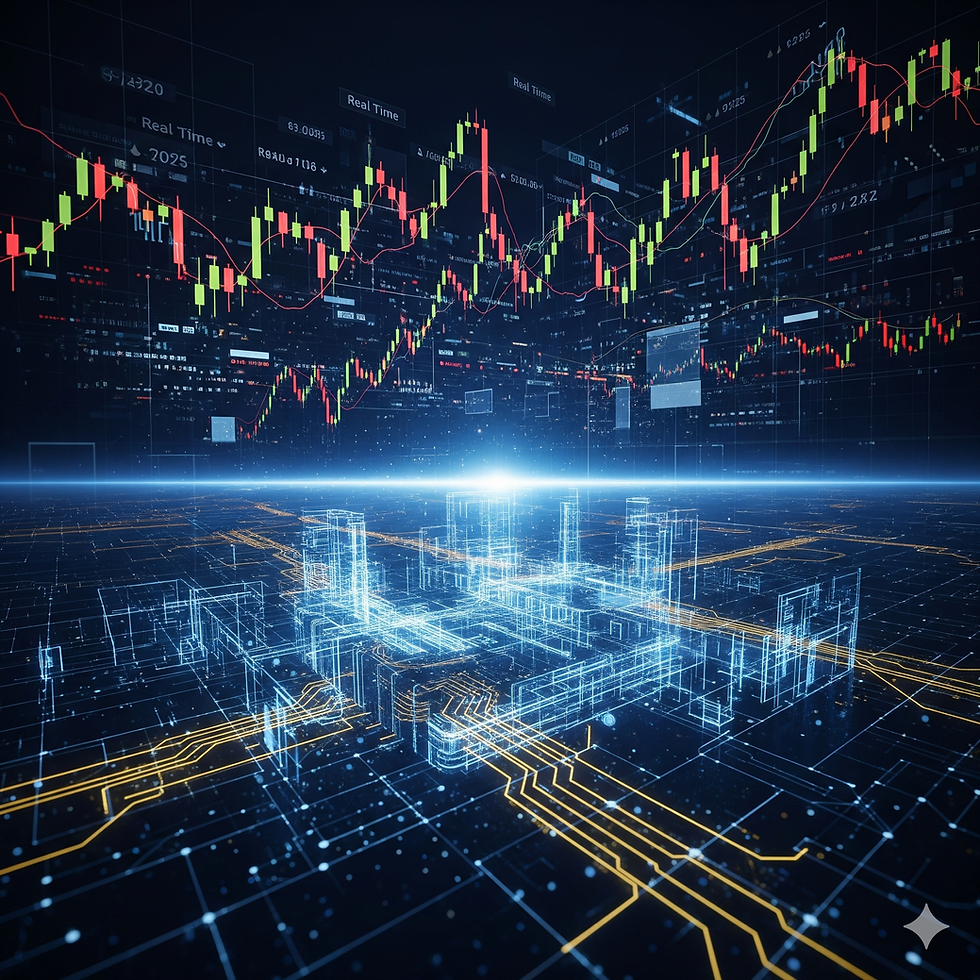Data Centres: The New Oil Fields—And the Light-Powered Future Traders Can’t Ignore
- Iftekhar Khan

- Sep 22, 2025
- 4 min read
Updated: Oct 12, 2025
The World Runs on Servers, Not Steam: Why Data Centres Matter for Traders
Forget coal and crude—today’s economy is powered by something far less glamorous: racks of humming servers in giant air-conditioned fortresses we call data centres.
Every cat video, every trading chart you stream, every “urgent” email about the latest meme-coin—somewhere, a data centre is doing the heavy lifting.

Why Traders Should Care about Data Centres
While data centres might sound as exciting as a warehouse full of beige boxes, they sit at the heart of two unstoppable trends:
Relentless Growth in Cloud Computing
The Big Three—Amazon Web Services, Microsoft Azure, and Google Cloud—continue to guzzle server capacity like a trader spotting free coffee.
The AI Gold Rush
Artificial intelligence isn’t just a buzzword; it’s a server-eating monster. Training large language models takes serious computing horsepower—and someone has to build the “gyms” for those silicon muscles.
Meet the Heavyweights
Think of the sector as a trading pit with three types of players:
Hyperscale Giants: Amazon, Microsoft, Google—owning and operating massive campuses.
REIT Landlords: Equinix and Digital Realty—providing the real estate and renting out space.
Hardware Powerhouses: NVIDIA, Arista Networks, and AMD—selling the picks and shovels for this digital gold rush.
Each group comes with different growth profiles and risk factors. Hyperscalers have scale but slower percentage growth; REITs offer steadier dividends but are rate-sensitive; hardware firms ride AI waves but can be volatile.
The Big Power Problem
Data centres don’t just hum—they devour electricity. The International Energy Agency projects global data-centre electricity use could double by 2026 and approach the consumption of an entire country like Japan. AI workloads are the main accelerant.
Closer to home, the UK is already debating the strain on local power grids. Planning permission, location, and energy sourcing are now as material to valuations as occupancy rates or rack density.
How Operators Are Fighting Back
1️⃣ Squeeze more from every watt
Liquid and immersion cooling slash fan power and improve thermals for AI racks. Smarter server design—targeting “green SKU” builds—cuts both power use and embodied carbon.
2️⃣ Carbon-aware scheduling
Moving flexible compute tasks to hours and regions with cleaner energy. Google already shifts workloads to support local grids during power emergencies.
3️⃣ Cleaner, firmer energy
Hyperscalers sign huge renewable PPAs for wind and solar, and are piloting 24/7 options such as enhanced geothermal. Microsoft even inked the first fusion-power purchase agreement—ambitious, but it signals where the sector is headed.
4️⃣ Don’t waste the waste heat
In parts of Northern Europe, server heat is piped into district heating systems to warm homes and offices—a free win when combined with modern liquid cooling.
Photonics Opportunities: Light Work From Sunlight to Silicon
The energy story isn’t just about buying more wind farms.
Next-gen solar: Perovskite-silicon tandem panels are hitting ~25% efficiency, meaning more power from less space—handy for on-site arrays and big renewable farms.
Compute with light: Silicon-photonics interconnects move data using photons instead of electrons, cutting the energy per bit and boosting bandwidth. Think of it as replacing copper motorways with laser-fast fibre inside the servers themselves.

And some companies are already staking claims in this “light-powered” future:
Company | What They’re Known For | Why It Matters |
Intel | Decade of silicon-photonics R&D; 400G & 800G optical modules already shipping. | Market leader in pluggable optics; key to AI data-centre build-out. |
Ayar Labs (private) | “Optical I/O” chiplets that move data inside servers using light. | Backed by Nvidia, Intel and Google; designed to slash energy per bit. |
Rockley Photonics | Integrated photonics for data-centre and wearable health sensors. | Smaller cap but a flexible platform across industries. |
Lumentum | Lasers and photonic components for high-speed telecom and AI clusters. | 400G/800G interconnect demand is surging. |
Coherent Corp. | Industrial lasers and Finisar’s datacentre optics. | Broad photonics portfolio for telecom and cloud. |
Infinera | Coherent optical transport systems. | Terabit-scale backbone networks for hyperscalers. |
Hamamatsu Photonics | High-end photodetectors and imaging sensors. | Key supplier for scientific and industrial optics. |
These players are essentially bringing the fibre-optic revolution inside the server rack, where moving data is now more power-hungry than computing it.
Why These Data Centres Could Be the Next Big Sector to Watch
For traders, data centres are no longer just “the internet’s basements”—they’re becoming energy assets with servers attached.
Opportunities extend beyond the REITs or cloud titans:
Power-constrained growth
Capacity is now capex + customers plus megawatts. Regions with abundant clean power (Nordics, select US grids) may outgrow others.
Grid-partnership premiums
Operators that can shift load, store energy, or offer demand response can win permits faster and secure cheaper power.
Technology plays
Liquid-cooling vendors, high-speed networking firms, and the photonics leaders above all ride the same AI density trends.
Policy tailwinds and headwinds
EU rules now require data-centre energy and water performance disclosure, creating both compliance costs and regional winners.
The CLiK Takeaway
Data centres are quietly transforming from dull server farms into the beating heart of the digital—and trading—economy. For market participants, the theme offers trend trades, event-driven opportunities, and diversification beyond traditional tech stocks. And as photonics moves from R&D to revenue, the “light revolution” could be the next leg of that story.
At CLiK Trading Education, we teach traders to build robust, repeatable strategies—so whether you’re eyeing a data-centre REIT, an AI chip maker, or the photonics innovators lighting the way, you trade with discipline, integrity, and a clear process.
👉 Curious? Check out our courses and discover how a structured approach can turn market noise—whether from AI servers or old-school pits—into opportunity.
The servers are humming. The photons are flying. The question is: will you be ready to trade the trend—or just buffer while others profit?




Comments